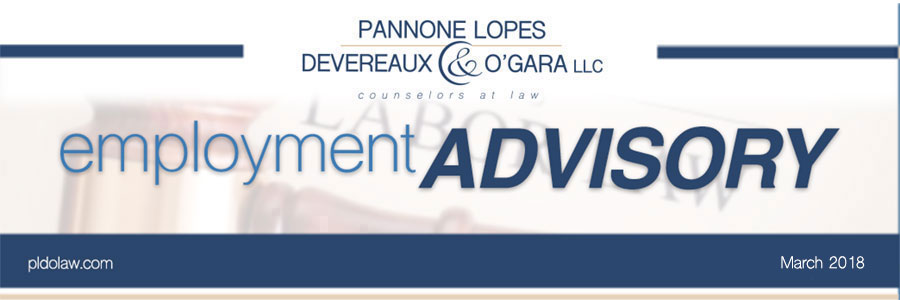 |
SEXUAL IDENTITY LAW CONTINUES TO EVOLVE
Federal law and precedent involving workplace discrimination based on sexual identity stands in stark contrast to current state laws in Rhode Island, Massachusetts and most “blue” states. However, that could change. Several federal  courts have recently recognized that Title VII – the federal anti-discrimination statute – provides protection to individuals on the basis of their sexual orientation. In Zarada v. Altitude Express, Inc., (cite February 28, 2018) the United States Court of Appeals for the Second Circuit recognized that Title VII applies to discrimination on the basis of sexual orientation. courts have recently recognized that Title VII – the federal anti-discrimination statute – provides protection to individuals on the basis of their sexual orientation. In Zarada v. Altitude Express, Inc., (cite February 28, 2018) the United States Court of Appeals for the Second Circuit recognized that Title VII applies to discrimination on the basis of sexual orientation.
Plaintiff Donald Zarada was a gay man who worked as a skydiving instructor. He was fired from his job after a female student complained that he informed her about his sexuality in advance of a tandem training skydive. One month later, Zarada filed a Charge of Discrimination alleging that his employer, Altitude Express, Inc., terminated his employment on the basis of his sexual orientation in violation of Title VII. Zarada was unable to defeat summary judgment at the trial court level and then lost on appeal before a three judge panel of the Second Circuit. Zarada then appealed to the full thirteen judge panel for the Second Circuit. The full panel held that Title VII prohibits sex discrimination any time that sex is a motivating factor. The Court found that “sexual orientation discrimination is motivated, at least in part, by sex and is thus a subset of sex discrimination.”
The Court reasoned that the language “because of sex” in Title VII could include sexual orientation discrimination because “[s]exual orientation discrimination is a subset of sex discrimination because sexual orientation discrimination is defined by one’s sex in relation to the sex of those to whom one is attracted, making it impossible for an employer to discriminate on the basis of sexual orientation without taking sex into account.
The Court also found that sexual orientation discrimination is also based on gender stereotyping. Employer decisions based on stereotyped impressions about the characteristics of males or females are a form sex discrimination. In this case, the Court looked at whether the employer would have terminated Zarada if he had been attracted to women. The Court found that the decision to terminate was based upon Zarada being a gay man and, therefore, was improper because the employer likely would have terminated Zarada if Zarada was attracted to women. This shows that employers must monitor their workplace for signs of overt sex discrimination and must also ensure that supervisors do not make decisions based upon gender stereotypes.
The case created a circuit split among the federal courts of appeal. The Seventh Circuit in Hively v. Ivy Tech Cmty. Coll., S. Bend also held that Title VII protects employees on the basis of their sexual orientation. However, the Eleventh Circuit, based in Atlanta, Georgia, reached the opposite conclusion in Evans v. Georgia Regional Hospital. This issue will likely come before the United States Supreme Court as more federal circuits weigh-in on whether Title VII protects employees on the basis of their sexual orientation. Rhode Island employees already enjoy this protection because sexual orientation is listed as protected class in the Rhode Island Fair Employment Practices Act.
.
[back to top]
“SILENCE” IN EMPLOYER POLICY IS NOT A DEFENSE
In Tudor v. Southeastern Oklahoma State University, Dr. Rachel Tudor, a transgender employee, brought claims against her employer. These claims included a hostile work environment claim where Tudor alleged that her coworkers  subjected Tudor to offensive comments, such as using an improper pronoun to refer to her and other gender based hostilities. The employer countered that Tudor had never made a complaint about her co-workers offensive conduct and the employer maintained an employee handbook that outlined reporting requirements for employees subject to discrimination. The employer argued that Tudor had not taken advantage of its reporting requirements and therefore there was no basis for employer liability. subjected Tudor to offensive comments, such as using an improper pronoun to refer to her and other gender based hostilities. The employer countered that Tudor had never made a complaint about her co-workers offensive conduct and the employer maintained an employee handbook that outlined reporting requirements for employees subject to discrimination. The employer argued that Tudor had not taken advantage of its reporting requirements and therefore there was no basis for employer liability.
In looking at this issue, the Federal District Court reviewed the employer’s handbook and noted that it did not include a policy addressing transgender discrimination or the type of hostility that Tudor endured as a result of her status as a transgender person. The policy was silent regarding transgender discrimination. The employer maintained sexual harassment and sex discrimination policies and argued that those policies addressed Tudor’s claims. The Court disagreed and noted that it was the employer’s responsibility to ensure its anti-discrimination polices addressed the specific form of discrimination complained of. The Court rejected any notion that Tudor should have assumed the employer’s sexual discrimination and sex harassment policies addressed Tudor, a transgender person, when discrimination on the basis of transgender identity was not specifically listed in those polices.
For an employer, Tudor shows the need to update your employee handbook and ensure that your company’s anti-discrimination polices specifically address all protected classes under state and federal law. If not, a terminated employee could allege a hostile work environment claim and have an actionable claim even if the employee never made a contemporaneous complaint pursuant to the employer’s handbook. If the handbook is silent regarding discrimination based on membership in a specific protected class, then Tudor holds that the employee will not be punished for failing to comply with an employer’s reporting requirements.
|
 |





 courts have recently recognized that Title VII – the federal anti-discrimination statute – provides protection to individuals on the basis of their sexual orientation. In Zarada v. Altitude Express, Inc., (cite February 28, 2018) the United States Court of Appeals for the Second Circuit recognized that Title VII applies to discrimination on the basis of sexual orientation.
courts have recently recognized that Title VII – the federal anti-discrimination statute – provides protection to individuals on the basis of their sexual orientation. In Zarada v. Altitude Express, Inc., (cite February 28, 2018) the United States Court of Appeals for the Second Circuit recognized that Title VII applies to discrimination on the basis of sexual orientation.  subjected Tudor to offensive comments, such as using an improper pronoun to refer to her and other gender based hostilities. The employer countered that Tudor had never made a complaint about her co-workers offensive conduct and the employer maintained an employee handbook that outlined reporting requirements for employees subject to discrimination. The employer argued that Tudor had not taken advantage of its reporting requirements and therefore there was no basis for employer liability.
subjected Tudor to offensive comments, such as using an improper pronoun to refer to her and other gender based hostilities. The employer countered that Tudor had never made a complaint about her co-workers offensive conduct and the employer maintained an employee handbook that outlined reporting requirements for employees subject to discrimination. The employer argued that Tudor had not taken advantage of its reporting requirements and therefore there was no basis for employer liability.